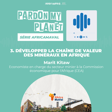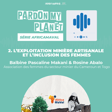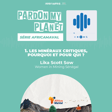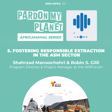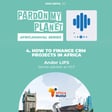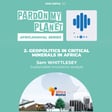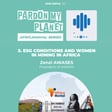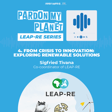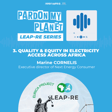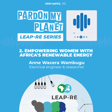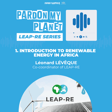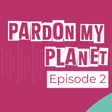Become a Creator today!Start creating today - Share your story with the world!
Start for free
00:00:00
00:00:01

Introduction to the AfricaMaVal project
The introduction episode features the project coordinator and offers an overview of the series and the key issues at hand.
Transcript
Introduction to Bridging Continents
00:00:10
Speaker
Hello, welcome to Pardon My Planet podcast. I'm Anchalotte, your host. We are launching a new series called Bridging Continents, the Africa-Europe partnerships for critical raw materials. In this series, we'll explore how Europe and Africa are working together to ensure fair and sustainable access to critical raw materials.
Exploring Africa-Europe Raw Materials Partnerships
00:00:32
Speaker
As demand for these resources rises, Europe must reimagine its value chain while maintaining strong partnerships with Africa.
Jean-Claude Guienou on Africa Maval Project
00:00:41
Speaker
Today, we are joined by Jean-Claude Guienou in charge of international institutional partnerships at BRGM, the French Geological Survey, who is also the coordinator of the Africa Maval Project. It's a European project dedicated to building EU-Africa partnerships on sustainable raw materials value chain. Hello, Jean-Claude.
00:01:05
Speaker
Hello, I'm Charlotte. Pleased to meet you. Pleased to meet you and thank you for for being here today. First, let's make sure we all talk about the same thing. What are we exactly talking about when we say critical raw materials? so we We are in the European context and so the European Commission is publishing every three years.
00:01:29
Speaker
a list of critical raw materials. So it's ah not only metals, as we used to s think, but that includes other things such as rubber and things like that. And also, we have at least products such as phosphate and graphite, which are not metals.
Importance of Critical Raw Materials
00:01:51
Speaker
But basically, we we are thinking mainly about metals when we speak about CRM, critical raw materials.
00:01:57
Speaker
And these metals are used the either for the energy and especially for the battery. So it's a main metal that we speak about usually, such as the lithium cobalt nickel, for example. So it's a wide range, which is increasing with the time, ah because some what we use to be to say is a strategy called metals, such as aluminum copper, for example.
00:02:26
Speaker
which are not critical in the field that ah we found it in big quantities in several countries in the world. but So they are key for the European bank industry and we know that we need ah big quantities of it.
00:02:44
Speaker
And that the existing mines are not especially able to produce this big quantity, especially in the near future. And as the developing countries are stronger and stronger, they use more and more copper. And there is no real alternative.
Evolution of Critical Raw Materials List
00:03:04
Speaker
And to start the copper mines, we are speaking about 15 years. So if we we have a lack of copper in 10 years,
00:03:14
Speaker
That means we had to found these mines five years ago. It's a lot of flooding. We are looking at this type of metals also as critical. You plan strategically and then also the list of critical raw materials, it evolves with time? Yes, in fact, it's increased always. For Africa Mavan, for example, we we have been using the list of 2020. In fact, we add several metals such as copper,
00:03:43
Speaker
Morganes, Tin, and Nickel, which were not in the list at the time, but most of them ah have been added to the list of 2023, so the more recent that we have ah actually. And so there is a start of dialogue within Europe about the new lists which may appear in 2020.
00:04:08
Speaker
but maybe yeah before
00:04:13
Speaker
in Europe and those organizations are participating to this discussion.
Ecological Transitions and Raw Materials
00:04:18
Speaker
Okay. And you mentioned, for example, things that we can find in our cars, but that's also what we think about when we think about critical raw materials. But does it have also a part to play in the ecological transition? Yes, absolutely. When we speak about windmills, for example, it's typically the case.
00:04:41
Speaker
ah So, it's also sort the case for solar cells, for example, and after it's pro-virtual sometimes, but for the nuclear power plant also, we need several meters, so in big quantity because ah several countries actually yeah are planning to build a new nuclear power stations and that make a big attention for some specific metals. Just to finish about the CNM, I would like to say that ah in in the European policies, the first objective is to increase the recycling of metals. And in fact, we know that some metals are produced or processed, especially in China.
00:05:22
Speaker
But so we import a lot of them. But if we recycle it in Europe, so that will compensate a part of what we need. ah The only thing that we are doing is to ah to look at the metals which are in Europe.
EU-Africa Agreements on Raw Materials
00:05:36
Speaker
Right. Also, the the first thing is always to avoid to use metals. And for example, the quantity of our house that we have in ah in a house has been decreased of 70 percent recently. so We do our best to avoid to use metals after we we do our best to recycle metals, after some of the metals are present something in Europe. And ah we we are looking around everywhere in Latin America, and ensure that far for Europe and and especially France, so our long-term relationship with ah Africa makes that we we are also looking at
00:06:21
Speaker
establishing a win-win partnership with ah with the African continent, generally speaking, and especially with ah some countries. ah Which countries are you referring to? In fact, the projects such as Africa-Maval, I am also the coordinator of a training program which is called Panaggio.
00:06:42
Speaker
ah we are working on the whole continent. So in Panavio, we have trained 2,000 African experts from the 54 countries in Africa, forgot so from all the countries of the African Union. After the European Union has established a dialogue with most of the African countries, they have got some memorandum of understanding, some agreements with some of the country in Africa. so there is ah for countries in Africa with which the European Union has signed an agreement, which are historically Namibia, DRC, Zambia and Rwanda.
00:07:23
Speaker
And what are you especially focusing on in the Africa Maval project ah with these countries?
Building Networks and Infrastructure in Africa
00:07:30
Speaker
Once again, Africa Maval is working at the continental scale. Yes. And in fact, we we are we are working with the all African, Pan-African organizations. So we have well establishing In fact, a global partnership, so ah developing, in fact, this partnership, because we are working together with Madi, for example, also since very long time. ah And this network, ah in which we have confidence to each other, and we establish a link and real ah willingness to do win-win projects,
00:08:11
Speaker
is a key point. So we have like that a very wide network and it's one of the two main targets in fact of Afrika Marwan. Okay so it's really building the partnerships and building a framework. Yes and doing it in in the time so we'll speak about the future later but so the the the question for us is to ah really to establish confidence at the continental scale, but especially with ah with some specific country. Establishing a network, ah business, relationship, social condition, and so on is important. In fact, the network is very open because Africa-Maval address not only the mining aspect, but also value chain of
00:09:01
Speaker
of the critical raw material, and that means ah mining, mineral processing, metallurgy, and product such as phosphate, for example, and which are produced already on the African continent. And also the infrastructure in terms of ah road, rail, harbor, if we we can contribute to such investment, for example, the European investment oh which is a the richest organization with which we we are working. And so they will not invest billions ah from Africa Milan, but we can contribute to to create the condition for such an investment.
Artisanal Mining and Employment in Africa
00:09:46
Speaker
And we are looking also at recycling, and we already see all recycling projects in Africa. Any investment or any project or proposal will be done in Africa.
00:09:58
Speaker
And also we address ah the question of artisanal and small scale mining, which is a very important aspect because that concerns millions of people in Africa. What are we talking about in terms of scales? ah So it's difficult to to say. So the there is some paper saying that ah up to 70 millions of people are served by artisanal and small-scale mining in Africa. ah You have sometimes, for example, when they found gold in Sudan, so you get 500,000 people going there, and so so it's massive. But you know we speak only about CRM because artisanal and small-scale mining, it's mainly gold.
00:10:48
Speaker
partly diamonds, but here we speak about the CRM. So in the CRM you have tin, for example, ah which is classically done also often by small-scale mining. So we consider as that between 5 and 10% of the global artisanal and small-scale mining activity concern the CRM.
Turning Points and Reports in Africa Maval
00:11:08
Speaker
Let's talk about timeline in this project. Where are you now in terms of development of the project and what are the next steps?
00:11:16
Speaker
Okay, we are about at the turn of the project, African Maval as such. We have done a lot of reports, which are interesting and which interest a lot of people within our microcosm. But for example, we have done case studies on 10 countries in Africa. And so they are available on our website, africanmaval.eu.
00:11:41
Speaker
ah So everything is transparent, you have all the information about these ten countries regarding the potential, regarding all the parameters of Africa-Maval, the potential network of of equipment, bottlenecks, certified ESG conditions, and also a list of proposals which can be developed know in these countries.
00:12:04
Speaker
ah for the development of critical raw material. And we do also some predictivity mapping. That means we yeah we open the door also to say that, okay, we are looking at several parts of the country, but there is some other way looking at the data task that we have, especially at BEAR-CHM and the African continent. We think that we may have found something You know, um the African continent is really underexplored. In comparison with Canada and Australia, it's a factor of 20, 50 times less exploration. And in fact, what is looked in ah in Africa, generally speaking, it's mainly
Trust and Ethical Investment in Africa
00:12:44
Speaker
gold. we We always speak about critical raw material, and there is a lot of conditions, but I think you
00:12:52
Speaker
you will speak also about geopolitics and geopolitique sensors difficulties, but so it's not so, the de-risking of projects in Africa is a key factor. And one of the conditions of de-risking is also to establish this network between between zoippprna for the academics side, on the NGO and on the profit organization side, and also on the investment investors, inventors,
00:13:20
Speaker
explorators and so on, also on the continent. As you mentioned, you mentioned this word, trust. ah there There is a trust to be built. ah Can you maybe ah elaborate a little bit on this? How is it key in this project and how is it key in the partnership between Europe and Africa? so In fact, will ah we consider that the European behavior may be different of some of our competitors looking at ah at the minerals in the you know it's the African continent and elsewhere, but especially in Africa. And so it's why we we take some some clear and giget engagement. For example, ah we speak about the proposal later on, but if we generate it any investment, it will be on in Africa.
00:14:12
Speaker
Also, we will do our best to ah to involve as many African as possible, burn and we will consider also the African developers and investors as a key partner. And we are looking at the ESG condition clearly as a key factor, ah which is not always the case of some other countries. trees so we We want to to use the soft power of Europe and ah ah the deal is that, ah okay, we we need metals for our industry, but we want to do work on a co-development ah with ah with the African country and do the investment there, help them, ah but also to build the the maximum of added value in Africa. All those things that we we we need in Africa is jobs
00:15:08
Speaker
So it's why we we are considering artisanal mining as a key issue first, because so we know that some condition of work. So we always speak about the kids in the RC and so on, but it's not only there and it's not only kids, but also women work and so on. So we we try to with organizations such as AVIMA or WIF or living sources. And so some of the partners of Afrika Mama were trying to ensure that
00:15:41
Speaker
development we will be try to promote will be done in the best conditions. Once the project ends, what do you hope to achieve and what can we expect even after the end of the project? Yeah. So ah to be practical, we we yeah put a target in ah in the project. So at the beginning when we launched it, you know it was a really a black box, but ah So we we decided to that we wanted to make at least 100 proposals, just proposals. Some of our partners speak about teasers, but so it just we identify project situation on which we consider that a European investment.
Recycling and Future Partnerships
00:16:27
Speaker
What we do now, especially, it's we have a lot of classical
00:16:33
Speaker
proposals. What do you mean by, by this? So it's a, it's a classical, a key element of the, the raw material value chain. So yeah, it could be a proposal on and the mining aspect and the mineral processing aspect. But we will look, especially at the project, which, are ah that we, we don't have enough on my point of view and of the team, ah such as ah recycling we are.
00:17:01
Speaker
also looking at the synergies between the European CRM Act and the new ah green mineral strategy of Africa, for example. So we will continue. But to use a network which is very original and to button the partnership with the Africa morale is
Future of European CRM Needs and Knowledge Transfer
00:17:21
Speaker
very wide. So we we want to use these ah this power and as this capability in fact to develop a new proposals and we we we want to to to go in the field in the different regions of Africa two to develop this type of project as much as we can. So we hope to start a new project mid 2025.
00:17:45
Speaker
as that we will call a panaview using the network and continue to develop a project. The idea is that gradually, in fact, to transfer to our African partners, all the tools a connection and so on, to to be able to end the know-how and also ensure an income of money to be able to continue uh this is a story developing project investment in africa
00:18:17
Speaker
OK, well, thank you very much, Jean-Claude, for taking the time to answer our questions. ah We have just scratched the surface of this topic of critical raw materials and mining in Africa. In the next episodes, we will explore the critical need of Europe for CRMs, the environmental, social and governance condition in mining in Africa, the condition of women and the financing opportunities.
00:18:43
Speaker
Stay tuned for the next episodes. They are available on all major platforms and at lgi dot.earth slash podcast. Until next time. Bye-bye.
